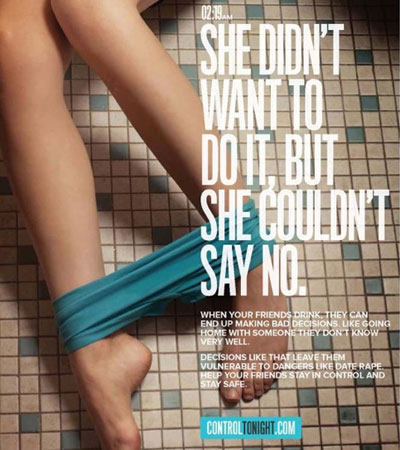The Pennsylvania Liquor Control Board probably thought it was "doing good" when it started airing and publishing ads like this:
The text reads:
She didn’t want to do it, but she couldn’t say no.
When your friends drink, they can end up making bad decisions, like going home with someone they don’t know very well.
Decisions like that leave them vulnerable to dangers like date rape. Help your friends stay in control and stay safe.
The advertisement caused a serious backlash, and rightly so. Let's unpack it a little, shall we?
First of all, the ad shows a shapely pair of legs on a bathroom floor with underwear around the (faceless) person’s ankles. In essence, it depicts a Hollywood image of rape (oh my, how sexy) that is stereotypical and — if you can believe it — almost suggestive. Now, so much advertising today is full of sexual imagery, but why would you want to "sex up" an ad that is about rape? Take away the text and you could have an ad for nylons, or underwear, or even floor tiling.
But clearly the most offensive thing is the text, which puts the onus of rape prevention on the woman, who (if the ad is to be followed) should not get drunk because it impairs her decision-making. Actually, it even puts the onus on the friends of women as well.
Not the rapist.
Mind you, the ad isn't wrong. Drinking too much is certainly terrible for you, and yes, alcohol is a risk factor in rape, as it is in robbery, getting run down by a car, or any other crime that requires physical evasion. But is that a compelling or fair reason to have to completely change one’s habits? The ad suggests that it is.
There's more insidiousness about the ad, and that is the fact that it comes from the Pennsylvania Liquor Control Board. Few people know this, but it’s easier to get away with sexual assault in Pennsylvania than anywhere else in the country. Why? Because it’s the only state that doesn’t allow expert testimony in rape cases. In other words, experts aren’t allowed to educate jurors about the behaviors of sexual assault victims and assailants. This means that jurors are left making uninformed judgments about the behavior of the parties involved. And all too often, "she was drunk" has been used as a successful way to "discredit" the victim in too many rape trials — people still think it’s solely a woman’s responsibility to guard against sexual assault. And this ad perpetuates that problem.
There's a happy ending to this story: the Pennsylvania Liquor Control Board, responding to thousands of protest calls, letters, and emails, has decided to yank the ads.


